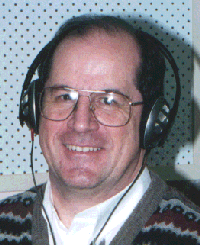


SB How did ĎCapital Computingí get started on Radio 1RPH?
Mike Youíll have to go back to the time when Karl Auer was doing the spot on the ABC every Sunday. Karl went away one weekend so he rang me up and asked if I wanted to be on the radio. So I went in and did a half hour program with Errol Silver. That carried on until just before Christmas last year. The ABC changed the Sunday programs so the program ended. Then about the same time Brian Miller who is a member of the PCUG but also presents the morning program at Radio 1RPH, actually wrote to Ann Byrne [PCUG President] and asked if the group would be interested in presenting a weekly program. So we thought it was a good idea. We thought we could do it and even have some fun. I went into the studio and talked to Brian about the details and it grew from there.
SB How long has the show been on the air now?
Mike The program was first broadcast on the 18th of April 1996 and we had a dry run at my place about a week before that. This week we did the 25th edition.
SB So who is involved in the show?
Mike The core team is Chris Arndt, Cynthia Shea, Petra Dwyer and myself plus whoever else we get on the program that week.
SB At what time is the show presented?
Mike Every Thursday at 10.45am and it is repeated 9.45pm. Itís on Radio 1RPH which is at 1125Khz on the AM dial.
SB What types of things are you doing on the show?
Mike I guess itís generally a regular format. Itís certainly changed from where we started and I guess itís still evolving really. We have a regular segment of what we call Ďa round up of news from the print mediaí, which is where you take news items from the print media such as The Australian, The Canberra Times and some of the more popular magazines and present those as articles in the news segment. Each week we try and do one feature article, we also try and do interviews with people who may or may not be members of the group. For instance we have spoken to Microsoft and the Australian Unix User Group.
SB Radio 1RPH has a special charter doesnít it?
Mike Yes it does. Itís mission statement, or charter, is really to provide a reading service to those people who are print handicapped. Print handicapped covers quite a wide range of things. These are people who are totally or partially blind, people who are dyslexic, or people who can understand English but not read it well. There are also people with disabilities which prevent them from reading. There are things like Parkinsonís disease, MS or other things like that that stop people from being able to hold a book or newspaper. They may be able to hold the book but not have enough dexterity to turn the pages. So itís a pretty wide range of people.
SB Do you have any goals for the future of the show?
Mike I think it will keep changing. We often times try new things. Sometimes not in a big way but sometimes in little ways like doing interviews out of the studio. Recently we just started using a telephone interface so we can do interviews by phone, which opens up a lot of avenues. We probably will try to tape a voice conversation over the Internet. We can use that to demonstrate to listeners what voice is like over the Internet but also we could use it as a real medium for doing interviews. We also try and do our own reviews of software but it is very demanding on time to do that properly. Itís not always easy to do on radio simply because you are trying to constantly paint a picture with words. You can write a review in a magazine and show a picture of the screen layout of something you are specifically addressing. You canít do that in radio, you can sit in the studio and wave your hands around and draw rectangles in the air but no one can see you.
SB Have you read any articles from the PC Users Group journal on the air?
Mike We do read from Sixteen Bits. We also have used the booklet produced by the group on purchasing computers to read from.
SB Whatís it like in the studio, did it come easy to you?
Mike Did it come easy? No, it takes quite a while to relax. I think the first time most people talk on radio, no matter how you try and prepare them, they always talk much faster than they would normally. Itís very hard. I think people actually go in there thinking, I have to remember this and remember that, and they try and blurt everything out in record breaking time so that they donít forget things. Even though you are taping the program and you can re-tape the errors, people still get nervous.
SB How long does it take to tape a show?
Mike The normal yardstick is that it probably takes between three to four times the broadcast time to tape it.
SB How can people reach you if they have feedback or questions about the show?
Mike We have an email address, letters.rph@pcug.org.au. Or they can send an email to me at mgellard@pcug.org.au. We are always happy to hear from people who would like to either work on the program on a semi-regular basis or people who would like to present a specific item.
SB Thanks Mike, Capital Computing sounds like a lot of fun.
 Back to Oct 1996 Index
Back to Oct 1996 Index